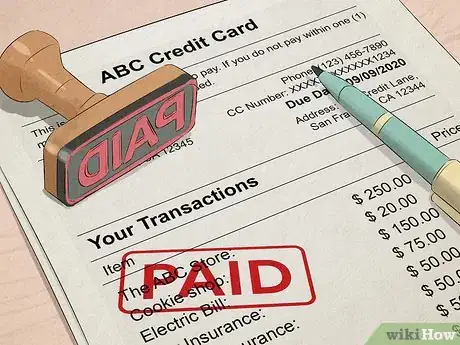This article was co-authored by Brian Colvert, CFP® and by wikiHow staff writer, Jessica Gibson. Brian Colvert is a Certified Financial Planner and the CEO of Bonfire Financial. With over 15 years of experience in finance, he specializes in helping others plan for a secure and confident financial leap into retirement. Brian holds a BA from San Diego State University.
There are 11 references cited in this article, which can be found at the bottom of the page.
This article has been viewed 15,635 times.
Planning for retirement can feel like a balancing act! You have to save for your retirement needs while currently paying expenses like a mortgage or monthly rent. Plus, you'll need to decide what type of housing will suit your retirement lifestyle best. We'll give you suggestions for renting, downsizing, or finding other ways to pay off a mortgage early so you can enjoy peace of mind during your golden years.
Steps
Paying off Your Mortgage
-
1Look for a smaller home to save on your mortgage and utilities. If you currently have more space than you need, ask yourself how much is really necessary. Maybe you're living in a 3-bedroom home and you really only need a 1-bedroom for yourself. If you purchase a smaller place, you'll most likely save money every month on housing.[1]
- Moving to a smaller place can also save you money on heating, cooling, and electricity costs.
-
2Relocate to a more affordable area. Make your retirement funds go farther by reducing your housing costs.[2] After all, your job isn't keeping you in your current city and you might be able to save a lot of money![3]
- Research the state's tax codes when you look at relocating. Some states might have lower taxes or a lower cost of living.
Advertisement -
3Refinance your mortgage if you're a homeowner. Consider it if you can get a full percentage point lower than your current rate. Yes, you will have to pay a refinancing fee based on the principal you still owe, but if you get a better rate, you can save thousands in the long run.[4]
- Ensure that your new mortgage terms match the time that's left on your current mortgage. For instance, if you've paid 10 years on a 30-year loan, don't take out a new 30-year loan. Instead, fix the term at 20 years so you don't end up paying more in interest.
-
4Switch to a short-term loan if you want to pay off a mortgage. You'll have a higher monthly payment, but you can pay off the mortgage faster. Plus, shorter loans usually have better interest rates so you pay less in interest over the life of the loan.[5]
- For instance, instead of paying off a 30-year mortgage, modify your terms so it's a 15-year mortgage.
-
5Pay down your current debts. It's hard to save for retirement if the interest on loans or credit cards is costing you. Look at your highest interest debts and make a plan to pay these down first or tackle your smaller balances if it motivates you to pay off debt faster.[6]
- Think of paying off debt as a form of investing. If you've paid off $1,000 that was financed at 16% interest, you're getting a 16% return on that money.
-
6Make additional mortgage payments to quickly pay off your mortgage. Extra payments toward principal will save you money on interest. They don't have to be huge payments either! Even paying an extra $50 a month could save you thousands of dollars in interest over the life of your mortgage. Look at your monthly expenses and find ways to cut back on spending.[7] [8]
- You might negotiate a lower cable bill or drop streaming services that you no longer use, for instance.
Renting a Home
-
1Weigh the personal pros and cons of renting versus buying. You might find that renting is cheaper than maintaining and owning a home, or you might realize that paying off your home early is a better fit for you. Don't forget to take your emotional needs into account—where will you feel happiest? Is it important for you to own property?[9]
- If you want flexibility in retirement, especially to travel, renting is probably a great option.
- However, if it's really important to you that you have a home to leave for your family, then it makes sense to explore options like refinancing, paying your mortgage off early, or looking for a home in a more affordable area.
-
2Find a roommate to split the cost of rent. This is a great option if you have friends who are looking for accommodations. Being able to split the rent payment as well as utilities can really help you save for retirement or stretch your retirement dollars even further.[10]
- Try to get a roommate that you get along with. This makes for the easiest living situation for everyone!
-
3Prepare for paying rent in retirement. Anticipate inflation and ensure that you put aside enough to cover rent.[11] Although there's no way of knowing what inflation will be when you retire, you can probably bet that inflation will make rent more costly. In the U.S. inflation usually fluctuates between 0% and 6%. You can search for the current inflation rate and use that in your savings calculator when you figure out how much monthly rent payments will cost.[12]
- For example, if your rent currently costs $1,500 a month and you plan to retire in a few years when you don't think inflation will be too high, you might calculate it at 3%. This gives you a monthly retirement rent payment of $1,700.
- It's always a good idea to focus your main investments, such as Social Security, to cover rent or mortgage, leaving other investments to cover other expenses.[13]
-
4Consider moving in with family to save on housing. Talk with family members so everyone's on the same page. Discuss whether you'll contribute to their housing costs and where you'll stay. You may be able to live in your own part of their home, or you may have a single bedroom. Either way, living with family is a great way to save for retirement or to help your retirement money last longer.[14]
- Plus, you'll have the comfort of knowing that your family is close by.
-
5Invest the money you're saving on housing. Fund your savings account or add to your 401(k).[15] If you're saving money by renting, put the extra money into your retirement savings. The earlier you do this, the better since your savings will accumulate interest that compounds.[16]
- For example, you might tell yourself that you have to save $250 a month toward retirement. Treat this like any other monthly expense and try to save more if you have extra income for one month.[17]
Expert Q&A
-
QuestionHow can I avoid liquidating my assets?
 Dmitriy FomichenkoDmitriy Fomichenko is the president of Sense Financial Services LLC, a boutique financial firm specializing in self-directed retirement accounts with checkbook control based in Orange County, California. With over 19 years of financial planning and advising experience, Dmitry assists and educates thousands of individuals on how to use self-directed IRA and Solo 401k to invest in alternative assets. He is the author of the book "IRA Makeover" and is a licensed California real estate broker.
Dmitriy FomichenkoDmitriy Fomichenko is the president of Sense Financial Services LLC, a boutique financial firm specializing in self-directed retirement accounts with checkbook control based in Orange County, California. With over 19 years of financial planning and advising experience, Dmitry assists and educates thousands of individuals on how to use self-directed IRA and Solo 401k to invest in alternative assets. He is the author of the book "IRA Makeover" and is a licensed California real estate broker.
Financial Planner You can avoid liquidating your assets by having such assets that generate passive income.
You can avoid liquidating your assets by having such assets that generate passive income. -
QuestionHow can I save money for retirement?
 Dmitriy FomichenkoDmitriy Fomichenko is the president of Sense Financial Services LLC, a boutique financial firm specializing in self-directed retirement accounts with checkbook control based in Orange County, California. With over 19 years of financial planning and advising experience, Dmitry assists and educates thousands of individuals on how to use self-directed IRA and Solo 401k to invest in alternative assets. He is the author of the book "IRA Makeover" and is a licensed California real estate broker.
Dmitriy FomichenkoDmitriy Fomichenko is the president of Sense Financial Services LLC, a boutique financial firm specializing in self-directed retirement accounts with checkbook control based in Orange County, California. With over 19 years of financial planning and advising experience, Dmitry assists and educates thousands of individuals on how to use self-directed IRA and Solo 401k to invest in alternative assets. He is the author of the book "IRA Makeover" and is a licensed California real estate broker.
Financial Planner Try getting some additional income by starting a side business besides working on your job. Save the earnings from the second source and use it for your retirement plans.
Try getting some additional income by starting a side business besides working on your job. Save the earnings from the second source and use it for your retirement plans. -
QuestionWhy is solo 401k beneficial?
 Dmitriy FomichenkoDmitriy Fomichenko is the president of Sense Financial Services LLC, a boutique financial firm specializing in self-directed retirement accounts with checkbook control based in Orange County, California. With over 19 years of financial planning and advising experience, Dmitry assists and educates thousands of individuals on how to use self-directed IRA and Solo 401k to invest in alternative assets. He is the author of the book "IRA Makeover" and is a licensed California real estate broker.
Dmitriy FomichenkoDmitriy Fomichenko is the president of Sense Financial Services LLC, a boutique financial firm specializing in self-directed retirement accounts with checkbook control based in Orange County, California. With over 19 years of financial planning and advising experience, Dmitry assists and educates thousands of individuals on how to use self-directed IRA and Solo 401k to invest in alternative assets. He is the author of the book "IRA Makeover" and is a licensed California real estate broker.
Financial Planner Solo 401k is a simplified version of the 401k retirement plan. It does not accommodate other employees except the owner and the spouse of the owner. There are just one or two participants. So it is easy to maintain, simple to administer, and very cost-effective.
Solo 401k is a simplified version of the 401k retirement plan. It does not accommodate other employees except the owner and the spouse of the owner. There are just one or two participants. So it is easy to maintain, simple to administer, and very cost-effective.
References
- ↑ https://money.usnews.com/money/blogs/my-money/2010/08/24/5-great-ways-to-downsize-effectively
- ↑ Brian Colvert, CFP®. Certified Financial Planner. Expert Interview. 27 May 2022.
- ↑ https://www.kiplinger.com/slideshow/retirement/t071-s014-what-s-your-retirement-housing-strategy/index.html
- ↑ https://www.aarp.org/money/credit-loans-debt/info-10-2011/refinancing-home-ask-sid.html
- ↑ https://www.knowyouroptions.com/options-to-stay-in-your-home/overview/modify-overview/modification
- ↑ https://www.consumerreports.org/personal-finance/how-millennials-can-achieve-financial-security-without-owning-a-home-a1281314810/
- ↑ https://www.bankrate.com/mortgages/prepaying-your-mortgage/
- ↑ Brian Colvert, CFP®. Certified Financial Planner. Expert Interview. 27 May 2022.
- ↑ https://www.aarp.org/work/retirement-planning/info-2014/rent-or-buy-house-in-retirement.html
- ↑ https://www.kiplinger.com/slideshow/retirement/t071-s014-what-s-your-retirement-housing-strategy/index.html
- ↑ Dmitriy Fomichenko. Financial Planner. Expert Interview. 30 June 2020.
- ↑ https://tradingeconomics.com/united-states/inflation-cpi
- ↑ Brian Colvert, CFP®. Certified Financial Planner. Expert Interview. 27 May 2022.
- ↑ https://www.yahoo.com/now/retirees-saving-money-aging-place-230014626.html
- ↑ Dmitriy Fomichenko. Financial Planner. Expert Interview. 30 June 2020.
- ↑ https://www.consumerreports.org/personal-finance/how-millennials-can-achieve-financial-security-without-owning-a-home-a1281314810/
- ↑ Dmitriy Fomichenko. Financial Planner. Expert Interview. 30 June 2020.















-Step-9-Version-2.webp)













-Step-9-Version-2.webp)



































